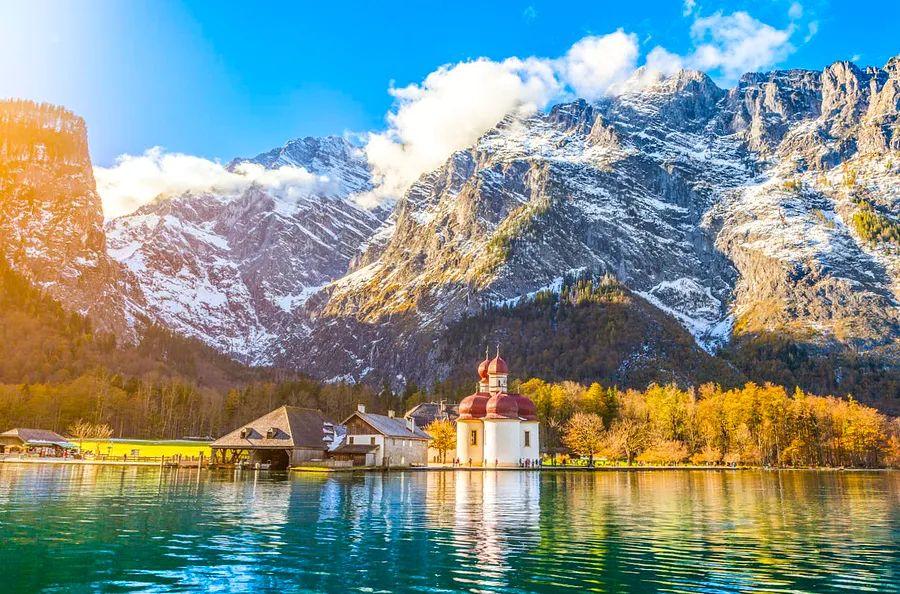What’s the ideal time to visit Germany? We’re here to help you make the decision.

Germany celebrates its seasons, hosting various events and festivities throughout the year.
With a warm southwest, a cooler northern coast, and a mountainous southern region, the weather varies greatly across states. Be sure to check the specifics for your chosen area, including upcoming festivals. This seasonal guide will assist you in planning the perfect time for your trip to Germany.
 Visit Germany from May to September for sunny weather – it’s the ideal time for a cycling adventure © Florian Augustin / Shutterstock.
Visit Germany from May to September for sunny weather – it’s the ideal time for a cycling adventure © Florian Augustin / Shutterstock.The optimal time for warmer weather is from May to September.
Germany experiences its warmest days between the blooming cherry trees of spring and the autumn foliage. July and August typically bring the highest temperatures, but they can also be accompanied by unpredictable thunderstorms, heavy rain, and even hail.
Visitors to the cooler coast should still consider these peak months, despite the influx of tourists. Those looking to hike, cycle, or engage in other outdoor activities may prefer the more stable weather conditions on either side of the peak months. School holidays in Germany are staggered by state, running from June to September.
 Oktoberfest is well-known for its lively atmosphere: enjoy the celebrations inside a large beer tent in Munich © anandoart / Shutterstock.
Oktoberfest is well-known for its lively atmosphere: enjoy the celebrations inside a large beer tent in Munich © anandoart / Shutterstock.The ideal months for enjoying a beer festival are September and October.
Munich's Oktoberfest begins in late September and continues into early October. During this period, hotel prices surge, and accommodations fill up months ahead. If the festival doesn't interest you, this might not be the best time to visit the city. For a similar experience with fewer crowds, consider the Starkbierfest (strong beer festival) in spring or various folk festivals throughout the year.
In other parts of Germany, late summer marks the height of wine festivals, including the Stuttgart Wine Festival, the Rheingau Wine Festival in Frankfurt, and the Wurstmarkt in Dürkheim.
March to May and October to November are prime months for budget-conscious travelers.
While the weather during these months can be variable, it generally feels milder than winter. These shoulder seasons offer excellent opportunities for budget travel with reduced accommodation rates and lower demand. Enjoy a quieter experience in city centers and historic towns, as well as major attractions without the crowds. Be ready to adjust your plans and wardrobe based on the weather forecast.
 Indulge in traditional Christmas gingerbread at a German Christmas market © Moskwa / Shutterstock
Indulge in traditional Christmas gingerbread at a German Christmas market © Moskwa / ShutterstockDecember is the prime month for experiencing Christmas markets.
Kicking off in late November and continuing through Christmas, Germany's markets fill towns, villages, and cities with aromas of hot mulled wine and sizzling sausages.
Visiting during this festive period will surely lift your holiday spirit and may even offer a chance of snow, though you'll face competition for accommodations as both locals and tourists flock to popular spots like Nuremberg and Dresden.
 Whether you're into downhill skiing or snow trekking, the Bavarian Alps are a winter wonderland © MITO images / Getty Images
Whether you're into downhill skiing or snow trekking, the Bavarian Alps are a winter wonderland © MITO images / Getty ImagesThe optimal time for skiing is from January to March.
The skiing season truly kicks off after Christmas, with the Alps and resorts like Garmisch-Partenkirchen just one to two hours from Munich airport. In areas lacking sufficient snow cover, it can feel cold and dark during this period. However, the café culture in cities like Berlin offers cozy, candlelit retreats, though be cautious of the icy sidewalks. Don't forget to wear a warm jacket.
In certain regions, including cities like Mainz, Düsseldorf, and Cologne, the early months of the year bring the excitement of Fasching or carnival leading up to Lent. Anticipate vibrant parades and a festive atmosphere—a delightful distraction from the winter chill.

1

2

3

4

5
Evaluation :
5/5